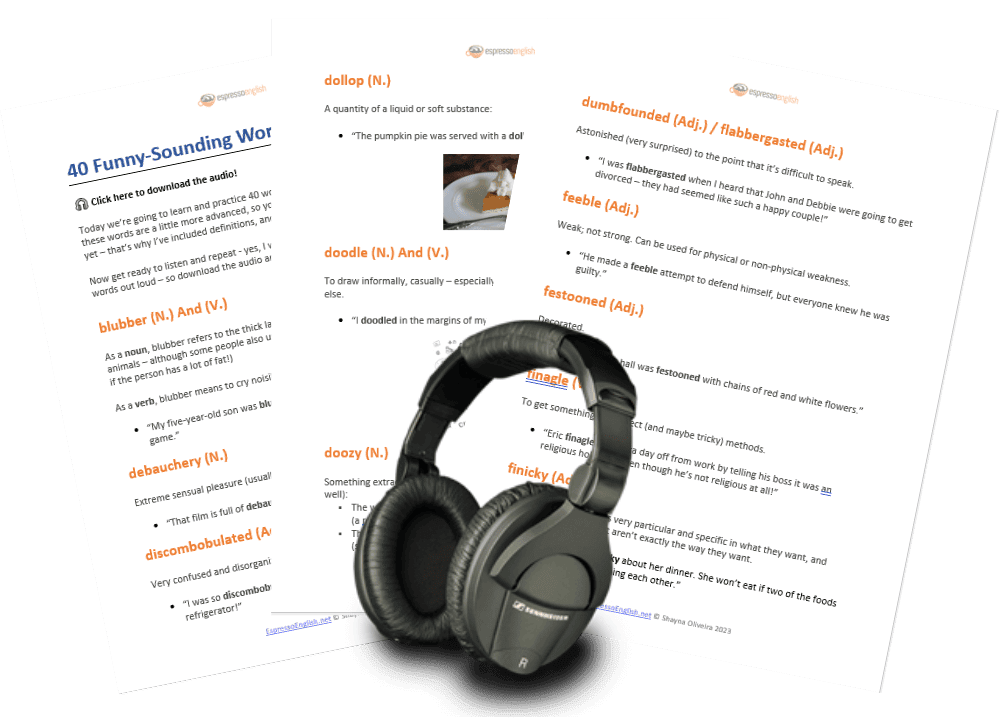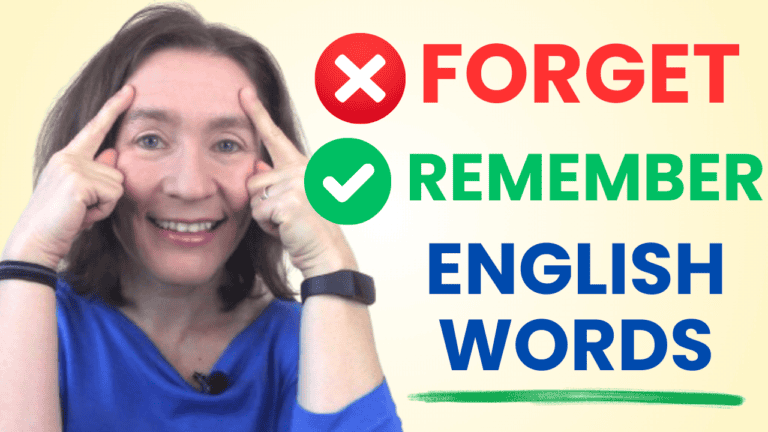
Want to learn some silly-sounding words in English? Here’s a list of words that are fun to say out loud! Listen and repeat to practice pronunciation of these funny-sounding English words.
blubber (n.) and (v.)
As a noun, blubber refers to the thick layer of fat on whales and other marine animals – although some people also use it to refer to human body fat (especially if the person has a lot of fat!) As a verb, blubber means to cry noisily: “My five-year-old son was blubbering for hours after I took away his video game.”
debauchery (n.)
Extreme sensual pleasure (usually involving sex and/or alcohol) – “That film is full of debauchery; it’s definitely not appropriate for children.”
discombobulated (adj.)
Very confused and disorganized – “I was so discombobulated this morning that I put my car keys in the refrigerator!”
dollop (n.)
A quantity of a liquid or soft substance – “The apple pie was served with a dollop of ice cream on top.”
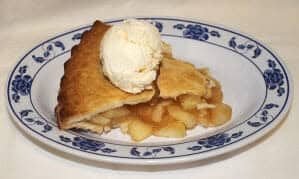
doodle (n.) and (v.)
To draw informally, casually – especially when you’re preoccupied with something else. – “I doodled in the margins of my notebook while the teacher was talking.”
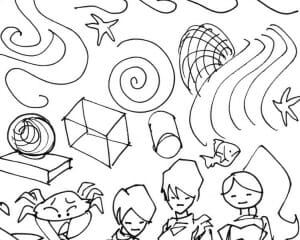
doozy (n.)
Something extraordinary (usually in a good way, but could be in a bad way as well):
- The whole season was great, but the last episode was a doozy.
(a really amazing/memorable episode) - The truth has finally come out about the political scandal – and it’s a doozy.
(something really shocking)
dumbfounded (adj.) / flabbergasted (adj.)
Astonished (very surprised) to the point that it’s difficult to speak. – “I was flabbergasted when I heard that John and Debbie were going to get divorced – they had seemed like such a happy couple!”
feeble (adj.)
Weak; not strong. Can be used for physical or non-physical weakness. – “He made a feeble attempt to defend himself, but everyone knew he was guilty.”
festooned (adj.)
Decorated. – “The banquet hall was festooned with chains of red and white flowers.”
finagle (v.)
To get something by indirect (and maybe tricky) methods. – “Eric finagled an extra day off from work by telling his boss it was an religious holiday – even though he’s not religious at all!”
finicky (adj.)
Describes a person who is very particular and specific in what they want, and doesn’t accept things that aren’t exactly the way they want. – “My daughter is a finicky eater. She won’t eat her dinner if two of the foods on the plate are touching each other.”
flummoxed / befuddled (adj.)
Completely confused. – “The police were befuddled by the complete lack of evidence at the crime scene.”
fuddy-duddy (n.)
A negative word for an old-fashioned person who does not accept modern trends. – “Maybe it makes me a fuddy-duddy, but I really don’t think mini-skirts are acceptable for job interviews.”
gargoyle (n.)
A statue of an animal or imaginary creature, often used in architecture to send rainwater away from the walls of the building.
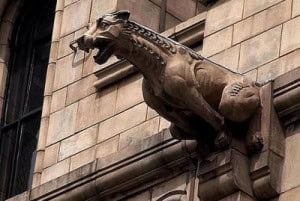
giggle (v.)
To laugh with high-pitched, short sounds – like a little girl.
gobbledygook / gibberish (n.)
Words that don’t make any sense and you can’t understand them. “My one-year-old nephew can say a few words, but most of what comes out of his mouth is gibberish.”
goggles (n.)
A type of thick protective glasses, to protect your eyes from danger. You can use goggles for swimming. Scientists also use goggles in the laboratory.
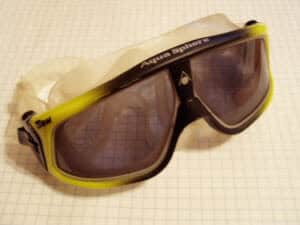
haphazard (adj.)
Dependent on chance, not well-organized or planned. “You’ll never be rich if you keep spending your money haphazardly.”
hodgepodge (n.)
A mix of random items of various types. – “This drawer contains a hodgepodge of office supplies – staples, clips, post-it notes, pencils, etc.”
hogwash (n.)
A negative term for describing facts, information, or beliefs that are ridiculous or false. – “Some people believe it’s unlucky to break a mirror, but I think that’s a bunch of hogwash.”
hoodwink (v.)
To deceive. – “The entrepreneurs hoodwinked investors by presenting the company as being more profitable than it actually was.”
hubbub / hullabaloo / ruckus (n.)
Loud noise from a confusion or agitated event. – “I looked out the window to find out the cause of the ruckus, and saw a bunch of teenagers having a party across the street.”
itty-bitty (adj.)
Informal word for “very small” – often used when talking with children. – “Look at the itty-bitty ladybug!”
pompous (adj.)
Arrogant. – “My last boss was a pompous jerk who thought he was superior to everyone else.”
rambunctious (adj.)
Describes a person (or animal) with a lot of energy, who tends to cause problems or make messes. – “I don’t know how Linda stays sane with five rambunctious kids under the age of ten.”
ramshackle (adj.)
Badly constructed, so that it is likely to fall apart. – “We crossed the river on a ramshackle bridge.”

shenanigans (n.)
Mischief, tricks, or problematic activities. – “George’s shenanigans got him into trouble at school.”
shrubs / shrubbery (n.)
Bushes – plants that grow thick vegetation and are close to the ground. – “The walkway to our house is lined with shrubbery.”

skedaddle (v.)
An informal word for leaving or running away. – “The neighborhood boys skedaddled after breaking a window with a baseball.”
squabble (n.) and (v.)
An argument or fight, usually over something small. – “The company’s president and vice-president are squabbling over the color of the business’ new logo.”
squeegee (n.)
A T-shaped tool used to remove water from windows and floors:
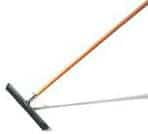
squelch (v.)
To suppress or inhibit: “This new medicine can squelch anxiety and boost your confidence.”
wishy-washy (adj.)
Describes a person who is weak in their decisions or character. – “My ex-boyfriend was so wishy-washy, he couldn’t even choose what movie to watch on a Friday night.”
I hope you end these words that sound funny. Can you think of even more silly words in English? Which ones do you think are the most fun to say?


